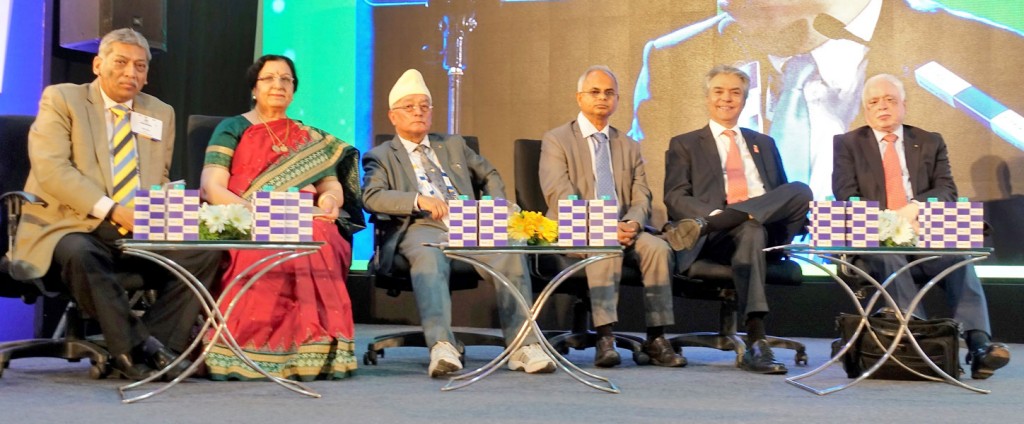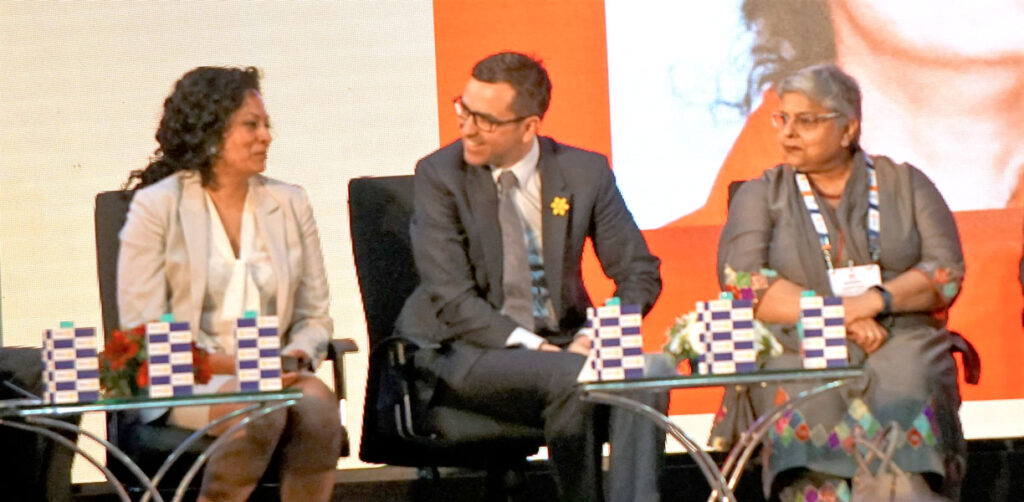
Total Literacy and Quality Education were the core planks of the three-day Rotary South Asia Literacy Summit that saw eminent persons discuss ways and means to liberate India from the shackles of illiteracy through sustained efforts.

Over 2,500 delegates exchanged ideas, spoke on project activities and missions yet to be accomplished, even as MoUs were inked to speed up the process of making the country fully literate. A few takeaways:
Teacher Support
India’s future depends on quality education and teachers are the fulcrum of all changes in the education sector. At present, there is a shortage of one million teachers in India with 6.5 lakh teachers working on an ad-hoc basis and need proper training. Addressing the delegates, PRID P T Prabhakar said, “We stress on teacher support because they hold the ladder of education and are more important than those who are climbing the ladder. Rotary has trained 15,000 teachers last year.”
Dr Anjlee Prakash, CEO, Learning Link Foundation, said, “Many classrooms in primary schools have a strength of about 70 children with varied backgrounds. It is a challenging task for the teachers; they need to be equipped with technology and should have a mentoring system.” Rotary is partnering with Learning Link to train one lakh teachers this year.
In rural areas, teachers lack English proficiency. Alan Gemmell, Director, British Council, said the Council has partnered with 12 State governments to skill teachers. Last September, it signed an MoU with District 3230 to improve English proficiency in schools in Chennai and Kancheepuram districts. “By 2020, the Council will train one million teachers in English language, proficiency in which can provide employment to 50 million youth by 2026.”
Asian countries have risen in international rankings of teacher proficiency in the past 15 years, said Racquel Shroff, CEO, Global Education. “Teaching is a respectable job in countries like Singapore, where the government has invested heavily in training teachers and made sure the profession is lucrative. A teacher earns at par with an engineer there,” she said.
Adult Literacy
Lord Raj Loomba, Founder-
chairman, Loomba Foundation, recalled in a video address how his late mother’s sufferings as a widow prompted him to support adult literacy. “When my father died, my grandmother, also a widow, ordered my mother to remove her jewellery. My mother who brought me up with good education was asked to move away from the mandap during my marriage. I thought about her sacrifices and want to help poor widows,” he said.
Deep Mukherjee of Star Sports, who is also the Secretary General of CII’s National Committee on Sports, suggested sports be included as part of the curriculum as schoolchildren lack physical exercise and tend to get obese.
Child Development
The TEACH App of RILM, launched at the Dubai Zone Institute, enables sponsoring of meals for undernourished children. Vandana Singh, CEO, Food Security Foundation, a unit of India Food Banking Network, said, “Malnutrition is grave among 200 million people in the country and its adverse effects on schoolchildren are yet to sink in among policymakers and the government. Millions of children don’t get nutritious food which is being wasted at hotels, parties, weddings and social events. Good nutrition would improve their cognitive abilities resulting in better learning outcomes.”
Installation artist Leena Kejriwal said there was a spurt in child trafficking and three million girl children were sold each year across the world. Giving a shocking statistic, she said, “Out of 16 million women who are sexually exploited globally, 40 per cent are children. The situation is alarming in India as girls in the age group of 9 and 12 are kidnapped and forced into prostitution and slavery.”
Happy Schools
Friendship and service are the driving force behind the school outreach activities of Inner Wheel clubs in India, which have renovated 700 government schools and 250 more such projects are underway this year. “It takes between Rs 1-5 lakh to rebuild and repair a dilapidated building,” said Prabha Raghunandan, Association President, Inner Wheel Clubs.
Inner Wheel has set up 200 E-learning centres and 300 Swabhimaan centres to quicken the pace of the literacy drive. Moreover, 3,500 poor children are sheltered in Asha Kiran homes run by Inner Wheel clubs and this has improved the enrolment ratio in schools. In the current year, Inner Wheel members have trained around 9,000 teachers and recognised 2,670 teachers with Nation Builder Awards.
PDG Ravi Vadlamani said Rotary has set up 1,500 Happy Schools in a year, with all the required amenities. RC Bangalore, D 3190, will be setting up 100 Happy Schools this year at a cost of Rs 5 crore.
South Asia update
The literacy rate in Pakistan is 60 per cent. However, in North Pakistan, where there are a lot of polio cases, literacy in women is less than two per cent. “It is a big challenge for us,” said PDG Aziz Memon, National Polio Chair, Pakistan, in the South Asia Update session. “A woman closing the door on vaccine workers does not know what she is doing. If more people are literate, Pakistan can become polio-free.”
Shanta Kumar Shrestha, Secretary, Ministry of Education, Nepal, said his government will be setting up 110 E-learning centres and sending back 10,000 children to school. An MoU was signed with District 3292 to transform 100 schools to Happy Schools and extend support for 500 teacher support programmes.
In Bangladesh, the government is wooing children back to school with programmes such as free books, mid-day meals and stipends, said Nazrul Islam Khan, its former Education Secretary. Currently, 78 lakh students are getting stipends.






